You are here
New Releases
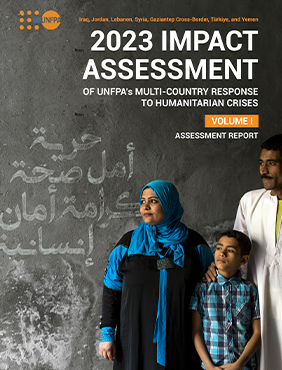
Regional Impact Assessment Of UNFPA’s Multi-Country Response to Humanitarian Crises
This assessment report is the seventh regional external evaluation of UNFPA humanitarian programming in the Syrian and Arab States region. It encompasses responses to the Syria crisis within Turkey, cross-border efforts from Turkey to Syria, and UNFPA humanitarian responses in Yemen. The report assesses the impact on women, girls, boys, and men across sexual and reproductive health (SRH), gender-based violence (GBV), and youth programs.
The 2023 assessment builds on previous annual impact assessments conducted since 2016, tracking the evolution of programming through the Syrian crisis, the COVID-19 pandemic, and now incorporating environmental, seasonal, and economic shocks impacting beneficiaries and implementing staff.
The findings of this assessment are intended to inform and enhance UNFPA programs. These insights will guide the design of new programs and the modification of existing ones. Additionally, the report aims to provide the donor community with a comprehensive understanding of UNFPA’s operations in both the Syrian regional response and the broader Arab States region.
The 2023 Impact Assessment builds on the methodology established in the 2021 Impact Assessment, which rationalized and systematized the various tools and questions used in previous research. It employs three primary research tools across three types of service delivery points (SDPs): Client Feedback Forms (CFFs) from service attendees, Focus Group Discussions (FGDs) with service attendees, and Key Informant Interviews (KIIs) with institutional stakeholders, including partners, service providers, and UNFPA staff.
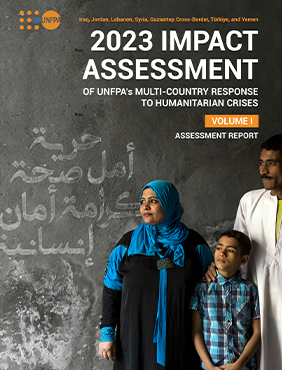
Regional Impact Assessment Of UNFPA’s Multi-Country Response to Humanitarian Crises - Summary
This assessment report is the seventh regional external evaluation of UNFPA humanitarian programming in the Syrian and Arab States region. It encompasses responses to the Syria crisis within Turkey, cross-border efforts from Turkey to Syria, and UNFPA humanitarian responses in Yemen. The report assesses the impact on women, girls, boys, and men across sexual and reproductive health (SRH), gender-based violence (GBV), and youth programs.
The 2023 assessment builds on previous annual impact assessments conducted since 2016, tracking the evolution of programming through the Syrian crisis, the COVID-19 pandemic, and now incorporating environmental, seasonal, and economic shocks impacting beneficiaries and implementing staff.
The findings of this assessment are intended to inform and enhance UNFPA programs. These insights will guide the design of new programs and the modification of existing ones. Additionally, the report aims to provide the donor community with a comprehensive understanding of UNFPA’s operations in both the Syrian regional response and the broader Arab States region.
The 2023 Impact Assessment builds on the methodology established in the 2021 Impact Assessment, which rationalized and systematized the various tools and questions used in previous research. It employs three primary research tools across three types of service delivery points (SDPs): Client Feedback Forms (CFFs) from service attendees, Focus Group Discussions (FGDs) with service attendees, and Key Informant Interviews (KIIs) with institutional stakeholders, including partners, service providers, and UNFPA staff.
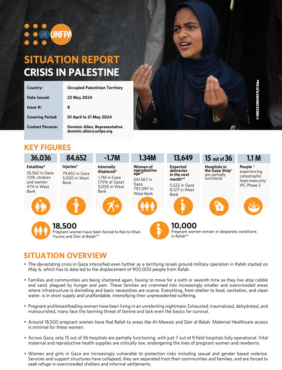
UNFPA Palestine Situation Report #8 - May 2024
The devastating crisis in Gaza intensified even further as a terrifying Israeli ground military operation in Rafah started on May 6, which has to date led to the displacement of 900,000 people from Rafah.
Families and communities are being shattered again, having to move for a sixth or seventh time as they live atop rubble and sand, plagued by hunger and pain. These families are crammed into increasingly smaller and overcrowded areas where infrastructure is dwindling and basic necessities are scarce. Everything, from shelter to food, sanitation, and clean water, is in short supply and unaffordable, intensifying their unprecedented suffering.
Pregnant and breastfeeding women have been living in an unrelenting nightmare. Exhausted, traumatized, dehydrated, and malnourished, many face the looming threat of famine and lack even the basics for survival.
Around 18,500 pregnant women have fled Rafah to areas like Al-Mawasi and Deir al-Balah. Maternal Healthcare access is minimal for these women.
Across Gaza, only 15 out of 36 hospitals are partially functioning, with just 7 out of 9 field hospitals fully operational. Vital maternal and reproductive health supplies are critically low, endangering the lives of pregnant women and newborns.
Women and girls in Gaza are increasingly vulnerable to protection risks including sexual and gender based violence. Services and support structures have collapsed, they are separated from their communities and families, and are forced to seek refuge in overcrowded shelters and informal settlements.
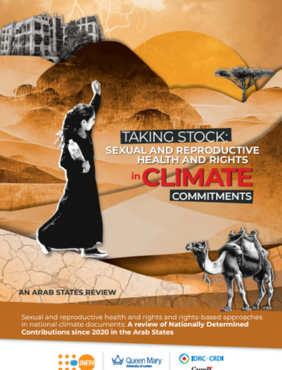
Taking Stock: Sexual and Reproductive and Health and Rights in Climate Commitments: An Arab States Review Summary
This document serves as a summary of the report, Taking Stock: Sexual and Reproductive and Health and Rights in Climate Commitments: An Arab States Review.
The Nationally Determined Contributions (NDCs) are the most central and globally representative climate policy documents that outline the national climate plans of countries that have ratified the Paris Climate Agreement. Submitted every five years, the NDCs indicate the voluntary commitments of countries to achieving agreed-upon mitigation and adaptation goals.
With climate impacts increasing in scale and intensity, communities on the frontlines are becoming more vulnerable, especially women and girls. As the year 2023 marked the conclusion of the first global stocktake of the Paris Agreement, this report reflects on how Arab States NDCs incorporated SRHR issues, and seeks to inform the third cycle of NDCs from the region to be submitted in 2025 . It is equally timely with the 30th anniversary of the International Conference on Population and Development (ICPD) to reassert the powerful links between population, sexual and reproductive health and rights, gender equality, and climate change.
UNFPA, in collaboration with Queen Mary University of London, conducted a systematic content analysis of SRHR references and related thematic areas in NDC documents for 15 of the 20 Arab States countries.
This regional report examines the integration of sexual reproductive health and rights and related themes - including health, gender, population dynamics, youth, human rights, vulnerable groups and participation - in the NDCs of countries from 2020 onwards. It offers recommendations on how the next submissions can more effectively address these intersections in terms of impact, commitments, budget and other critical actions.
Following the outcome of COP28 in Dubai, countries were requested to submit their next NDCs “at least 9-12 months in advance” of COP30 in Brazil at the end of 2025. These reports will help guide stakeholders across the region to ensure that the next submissions of NDCs have a full and substantive reflection of the intersections of climate, SRHR, GBV and harmful practices.
Access the full report here.
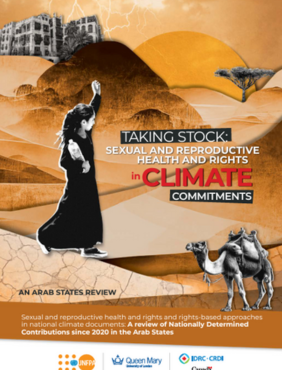
Taking Stock: Sexual and Reproductive and Health and Rights in Climate Commitments: An Arab States Review
The Nationally Determined Contributions (NDCs) are the most central and globally representative climate policy documents that outline the national climate plans of countries that have ratified the Paris Climate Agreement. Submitted every five years, the NDCs indicate the voluntary commitments of countries to achieving agreed-upon mitigation and adaptation goals.
With climate impacts increasing in scale and intensity, communities on the frontlines are becoming more vulnerable, especially women and girls. As the year 2023 marked the conclusion of the first global stocktake of the Paris Agreement, this report reflects on how Arab States NDCs incorporated SRHR issues, and seeks to inform the third cycle of NDCs from the region to be submitted in 2025 . It is equally timely with the 30th anniversary of the International Conference on Population and Development (ICPD) to reassert the powerful links between population, sexual and reproductive health and rights, gender equality, and climate change.
UNFPA, in collaboration with Queen Mary University of London, conducted a systematic content analysis of SRHR references and related thematic areas in NDC documents for 15 of the 20 Arab States countries.
This regional report examines the integration of sexual reproductive health and rights and related themes - including health, gender, population dynamics, youth, human rights, vulnerable groups and participation - in the NDCs of countries from 2020 onwards. It offers recommendations on how the next submissions can more effectively address these intersections in terms of impact, commitments, budget and other critical actions.
Following the outcome of COP28 in Dubai, countries were requested to submit their next NDCs “at least 9-12 months in advance” of COP30 in Brazil at the end of 2025. These reports will help guide stakeholders across the region to ensure that the next submissions of NDCs have a full and substantive reflection of the intersections of climate, SRHR, GBV and harmful practices.
Access the report summary here.
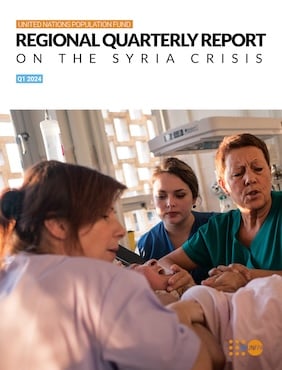
Regional Quarterly Report on the Syria Crisis
As of Q1 2024, the needs of Syrians and host communities are higher than ever, particularly in light of widespread economic collapse, the cumulative impact of 13 years of conflict, climate-related challenges, natural disasters, and various other socio-political factors. Despite the continuing efforts of humanitarian actors, the Syria crisis remains one of the world’s most complex humanitarian and protection emergencies. In 2024, 16.7 million people are in need of humanitarian assistance — the highest number since the onset of the crisis in 2011. This includes more than 8 million women and girls, around 4 million of whom are of reproductive age. Meanwhile, more than 6 million Syrian refugees remain displaced in five neighbouring countries – Türkiye, Lebanon, Jordan, Iraq and Egypt, nearly half of whom are women and girls.
This report offers a bird’s eye view of UNFPA’s operations within the context of the Syria crisis. The report is prepared by the UNFPA Regional Humanitarian Hub for Syria and the Arab States (The Hub) in Amman, and spans operations led by UNFPA offices in Türkiye, Lebanon, Jordan, Iraq, and Egypt, in addition to the Whole of Syria (operations led inside Syria, both from Damascus and cross-border via Gaziantep). With the exception of data on service delivery points, the quantitative data presented in this report is cumulative, covering achievements made between January and the reporting quarter.
Innovation in the Arab region: A strategy paper to Imagine, Invent, Impact
The Arab region is brimming with talent, drive and energy and boasts a growing innovation ecosystem, advanced tech start-ups, high internet access and digitized markets. UNFPA in the Arab states unleashes innovation to bring transformative change in a region where war, poverty and complex emergencies continue to harm and hold women and girls back. This strategy has been developed by the UNFPA Arab States Regional Office and the UNFPA Arab iNetwork. It demonstrates the commitment of UNFPA in the Arab region to innovation and outlines three strategic priorities for regional impact. The strategy provides a set of recommendations for the UNFPA Regional Office and country offices accompanied by a Results Framework for 2024 and 2025. The strategy will support UNFPA in the Arab region to accelerate innovation towards the three transformative results and enable the transformative impact it can offer. The time is now, and we must aspire to no less than disruptive solutions reaching women and girls fast, efficiently and at scale, with life saving services and norm breaking innovations.
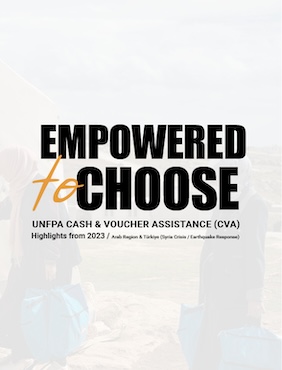
Empowered to Choose (UNFPA Cash and Voucher Assistance (CVA))
UNFPA's experience in different humanitarian contexts has shown that cash and voucher assistance (CVA) is a powerful instrument that can save lives, alleviate risks, and help women and girls escape abusive environments.
By giving women and girls greater access to vital services and empowering them with the freedom to choose, UNFPA has found that CVA can directly contribute to the realisation of the Three Transformative Results of zero unmet need for contraception, zero preventable maternal deaths, and zero gender-based violence and harmful practices, which UNFPA is committed to achieving by the year 2030.
This fact sheet provides an overview of key achievements made in 2023 under UNFPA’s CVA programming throughout the Arab region and Türkiye, as part of its regional response to the Syria crisis (and the 2023 earthquakes in Türkiye and Syria).
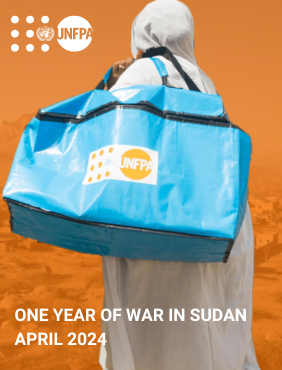
UNFPA Sudan Emergency Situation Report #12 - April 2024
One year of war in Sudan has triggered the world's largest displacement crisis. 8.5 million people have been forced to flee their homes, with over 6.5 million people displaced within Sudan, including 1 .56 million women and girls of reproductive age. Among them, nearly 155,500 are pregnant women, and an estimated 52,000 childbirths are anticipated in the next three months.
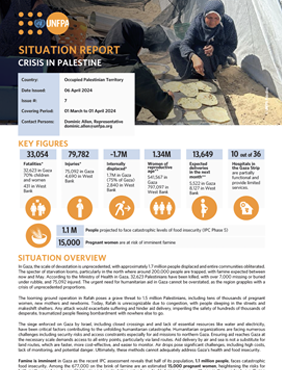
UNFPA Palestine Situation Report #7 - 06 April 2024
During March 2024, the hostilities in Gaza escalated, exacerbating an already unprecedented and dire humanitarian situation. The scale of devastation is overwhelming, with approximately 1.7 million people displaced and entire communities obliterated. The specter of starvation looms large, particularly in the north, where around 200,000 people are trapped, with famine expected between now and May. According to the Ministry of Health in Gaza, the death toll has reached 32,623 Palestinians, with over 7,000 missing or buried under rubble, and 75,092 injured. The urgent need for humanitarian aid in Gaza cannot be overstated as the region grapples with a crisis of unprecedented proportions.
UNFPA responded by delivering life-saving reproductive health supplies and gender-based violence prevention materials to health facilities and shelters across the region. This included essential pharmaceuticals, medical equipment for obstetric facilities, and postpartum kits for new mothers in IDP shelters. Additionally, UNFPA provided primary healthcare services, antenatal and postnatal care, and psychosocial support sessions for displaced women, girls, and adolescents.